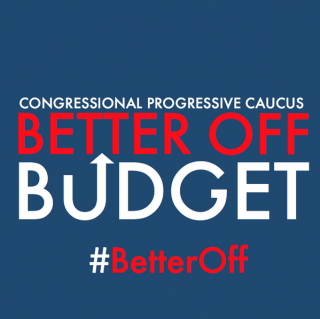 Though the champions of Fix the Debt are now on the run, proponents of the grim-and-tired “We’re broke, we can’t afford it” line of argument continue to throw their weight around our federal budget debates.
Though the champions of Fix the Debt are now on the run, proponents of the grim-and-tired “We’re broke, we can’t afford it” line of argument continue to throw their weight around our federal budget debates.
The Obama administration tried for several years to accommodate the Fix the Debt crowd. This year, the administration more-or-less gave up and delivered a budget that dared to declare that balancing the budget should not trump all other national goals. “Dead on Arrival” was the right wing’s rather predictable response.
Through all of this unproductive budget wrangling, one group—the Congressional Progressive Caucus (CPC)—has, year after year, performed the feat that no other group of our legislators seems able to pull off. The CPC produces budgets that balance significant deficit reduction over a ten year period with substantial investments in the near term to create jobs, strengthen the safety net, and reduce inequality—the kinds of investments that the budget austerity folks tell us we can’t afford. This group of seventy-plus progressive House members just released this year’s version, the “Better Off Budget.”
The CPC is able to reach their investment targets, in part, by going after areas of wasteful spending that other legislators won’t touch — for example, the enduringly large war budget (aren’t those wars ending?), tax havens for the rich, and oil company subsidies.
Other highlights from the CPC’s proposal include:
- Fixing overspending in Overseas Contingency Operations (OCO). Though we are finally winding down the longest period of war in our history, the OCO (the President’s war budget — separate from, but added to, the “regular” Pentagon budget) has hardly shrunk at all.
- Investing in the repairs needed for our deteriorating water, energy, and transportation infrastructure and creating jobs in the process.
- Implementing a small tax on financial transactions. More than 30 countries around the world already have this tax, and it would slow down reckless speculation while also generating revenues.
- Improving the Affordable Care Act by adding a public health insurance option into the health insurance marketplaces.
- Imposing a tax on carbon with 25% of the revenues applies to refundable credits for low income families, which would also serve to strengthen the market for clean energy and transportation.
- Enacting public financing for campaigns to curb the ever-more- corrosive effect of money in politics
In a couple of weeks, House Budget Committee Chairman Paul Ryan — the true champion of “We’re broke” — will unveil his budget. As he’s already promised, it will slash programs like Head Start and job training (presumably because they sap the initiative of three-year-olds and the unemployed.) A clear alternative, a Better Off Budget, will be there ready to take him on.